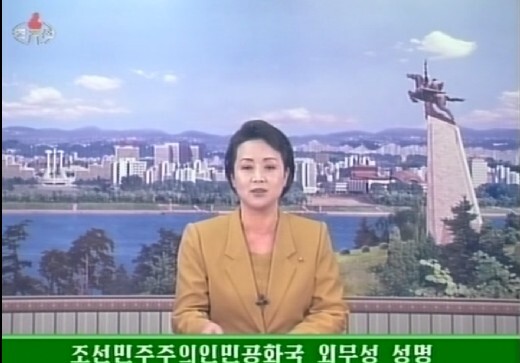hankyoreh
Links to other country sites 다른 나라 사이트 링크
N. Korea loudly declares its withdrawal from six-party talks

North Korea says it will stop participating in the six party talks and refuses to move forward on denuclearization agreements in response to the United Nations Security Council’s “presidential statement” about its recent rocket launch. This recent development means the Korean peninsula will see increased tensions for some time to come.
“The six-party talks have turned into a platform for infringing upon the sovereignty of the DPRK and forcing the DPRK to disarm itself and bring down the system of the DPRK,” North Korea’s Foreign Ministry said in a statement released through the North Korea’s state-run Korean Central News Agency. It also says, North Korea “will no longer participate in the talks, nor will it be bound to any agreement of the six-party talks.”
The statement also says it is going to restart activity at its nuclear facility at Yongbyon, after halting operations there in July 2007, and that it will begin reprocessing to extract weapons-grade plutonium.
“We have no choice but to further strengthen our nuclear deterrent to cope with additional military threats by hostile forces that say they are going to shoot down a peaceful satellite.” It could be interpreted that the DPRK will take measures for restoring the nuclear facilities to their original state, which had been disabled under the agreement of the six-party talks, place their operations back on track and fully reprocess the spent fuel rods.”
The language used in the statement is stronger than might have been expected, but given the premise it provides, some analysts interpret it as indicating that North Korea might not directly move to action. They read the statement as leaving some room to wait for a reaction by the U.S.
The statement can be translated as saying that North Korea is not going to participate in the six party talks, …han isang can just as easily be translated to mean, “as long as the six-party talks have turned into a platform for infringing upon the sovereignty of the DPRK and forcing the DPRK to disarm itself and bring down the system of the DPRK” in place of “now that the six-party talks...” This room for dual interpretation leaves some to suggest that North Korea is not entirely saying no to the talks.
The statement is also not as severe as the one North Korea’s Foreign Ministry immediately issued after the UN Security Council passed a resolution condemning its missile launch in July 2006. At the time, it promised an “even stronger physical action.” In effect, the result was the testing of a nuclear device in October of the same year. This time, however, it says only that it will “bolster its nuclear deterrent for self-defense” in addition to reprocessing its spent fuel rods.
The UN Security Council’s presidential statement denounces the recent rocket launch and reaffirms Resolution 1718, however, as it has no legal binding, it is all “words.” North Korea’s response is likewise “loud,” but they have not yet reached the point of issuing a “resolution.”
The statement North Korea has issued saying it will no longer participate in the six party talks might be a message demanding direct negotiations with the U.S. However, this “war of words” that rejects participating in the six party talks could become an obstacle to bilateral dialogue, lead to unnecessary misunderstanding and cause unintended tension.
Please direct questions or comments to [englishhani@hani.co.kr]
Editorial・opinion
![[Editorial] Does Yoon think the Korean public is wrong? [Editorial] Does Yoon think the Korean public is wrong?](https://flexible.img.hani.co.kr/flexible/normal/500/300/imgdb/original/2024/0417/8517133419684774.jpg) [Editorial] Does Yoon think the Korean public is wrong?
[Editorial] Does Yoon think the Korean public is wrong?![[Editorial] As it bolsters its alliance with US, Japan must be accountable for past [Editorial] As it bolsters its alliance with US, Japan must be accountable for past](https://flexible.img.hani.co.kr/flexible/normal/500/300/imgdb/original/2024/0417/6817133413968321.jpg) [Editorial] As it bolsters its alliance with US, Japan must be accountable for past
[Editorial] As it bolsters its alliance with US, Japan must be accountable for past- [Guest essay] Amending the Constitution is Yoon’s key to leaving office in public’s good graces
- [Editorial] 10 years on, lessons of Sewol tragedy must never be forgotten
- [Column] A death blow to Korea’s prosecutor politics
- [Correspondent’s column] The US and the end of Japanese pacifism
- [Guest essay] How Korea turned its trainee doctors into monsters
- [Guest essay] As someone who helped forge Seoul-Moscow ties, their status today troubles me
- [Editorial] Koreans sent a loud and clear message to Yoon
- [Column] In Korea’s midterm elections, it’s time for accountability
Most viewed articles
- 1[Column] The clock is ticking for Korea’s first lady
- 2Samsung barricades office as unionized workers strike for better conditions
- 3[Editorial] When the choice is kids or career, Korea will never overcome birth rate woes
- 4[News analysis] After elections, prosecutorial reform will likely make legislative agenda
- 5Why Israel isn’t hitting Iran with immediate retaliation
- 6S. Korea, Japan reaffirm commitment to strengthening trilateral ties with US
- 7[Editorial] Does Yoon think the Korean public is wrong?
- 8[Guest essay] How Korea turned its trainee doctors into monsters
- 9[Editorial] 10 years on, lessons of Sewol tragedy must never be forgotten
- 10Strong dollar isn’t all that’s pushing won exchange rate into to 1,400 range